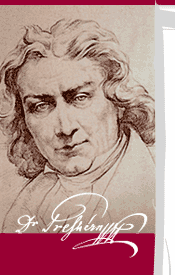| |
|
|
| 1839 |
"I work seven hours, so I can then
drink for two" |
|
| |
|
|
 |
omewhere on the margin of all these
stormy events in the life of the increasingly resigned
poet stood the young Ana
Jelovšek. Prešeren met her in Crobath's home, where
she was a nanny, when she was only thirteen. At first
she created no impression on him, even though Ana was
supposed to be the sort of girl men liked. Later, however,
a relationship developed between them, which may have
been the only real sexual experience Prešeren ever had,
as well as bringing the poet's final moral and general
downfall. He may really have intended to have a family
with Ana and start living a normal middle-class life -
this certainly was her greatest wish - but there was little
realistic chance of that happening. Prešeren was a timid
and reserved man, whilst Ana was a lively and quite carefree
girl; she put their three illegitimate children into foster
homes. Prešeren did not write any love songs dedicated
to Ana throughout the time of their relationship. The
only poem on the subject of their "love" was Nezakonska
mati (The Unmarried Mother), which is rather problematic,
considering that the father of these illegitimate children
was Prešeren himself. The depth of their relationship
is shown by the anecdote recorded by their daughter Ernestina
Jelovšek. When Andrej
Smole suddenly collapsed and died in Prešeren's arms
at the dinner honouring his name-day, the poet later,
full of grief, sought comfort from his mistress. Her response
was to ask "And who ate up all the rabbit?" Prešeren,
disappointed and distraught, went to an inn, which was
to become his second home. He had plenty of reasons for
drinking: his application for a legal practice had been
rejected yet again, his friends were dying one after another,
Ana was not the right woman for him, Julija
was happily married, even his poetic creativity was diminishing.
The poet became more and more known for the verses he
composed while drunk and for his obscene compositions.
His appearance, too, was rather sad: he looked fat and
neglected. His mental state was fairly accurately summed
up in a remark in a letter to Stanko Vraz: "I work for
Dr Crobath seven hours a day, so I can then drink for
two at Metka's!" This inn was the home of Jerica Podboj,
Metka's daughter. Prešeren fell in love with the young
girl and dedicated quite a few poems to her (Ukazi
- Commands, Pod
oknom - Under the Window, Prošnja
- A Request). This was a typical Prešeren love, "without
any hope of victory", as Jerica showed no sign of having
any feelings for the poet. Not long after, she married
an English industrialist, the co-owner of the Ljubljana
spinnery.
|
|
| |
|
|
| |
|
|
   |
|
|
|
|


